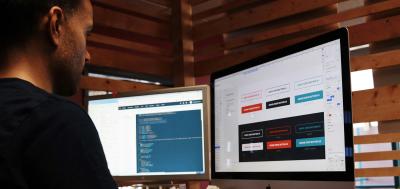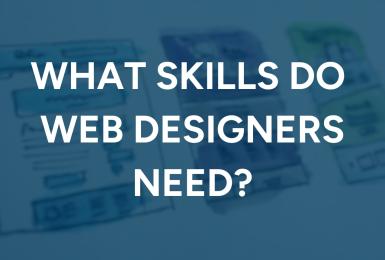Do you enjoy working with computers and flexing your creativity? If so, a career in web design may be right for you. Not only are there numerous roles you can take on as a web designer, but the demand for these professionals only continues to increase. What should you know about a career in web design? Whether you're already working in a related field or looking to transition to a new career path, here’s what you need to know.
Job Market Demands and Outlook for Web Design Professionals
These days, you would be hard-pressed to find a business of any size without some kind of web presence, typically including a functioning website (at the very least). Experienced web designers create these sites. With more people launching websites, the demand for knowledgeable and skilled web designers is high. In fact, according to the Bureau of Labor Statistics, the job outlook for web developers and digital designers is expected to grow by 16 percent between 2022 and 2032 alone. That's much faster than the average for all occupations (3 percent).
Salary and Job Satisfaction
What kind of web designer salary can you expect in this field? Ultimately, many factors determine how much a web designer will make, including the region where they work, level of experience, and job responsibilities.
According to the BLS, the average web developer or digital designer makes about $80,000 per year or just under $39 per hour. However, this is just the median wage—and some designers make upwards of $150,000 annually.
Working as a web designer can also be quite gratifying. In fact, according to a CareerExplorer survey of millions of web designers, these professionals rate their career satisfaction at an average of 3.3 out of 5, putting them in the top 42 percent of all careers.
What Does a Web Designer Do?
So, what exactly does a web designer do? It's about more than creating websites with great visual elements. With a better understanding of what a typical day may look like for a web designer, you can more confidently determine whether this is the right career path for you.
Typical Day-to-Day Responsibilities
The primary responsibility of a web designer is to plan, design, and build the interface of a website for a client. However, there is a lot that goes into achieving this end goal. Some common daily responsibilities and duties of a web designer include:
- Meeting with clients to discuss goals and expectations
- Solving problems and bugs with website coding
- Creating data backups
- Collaborating with other professionals
- Designing webpage layouts and navigation
- Ensuring a site has a responsive design
The Variety of Projects a Web Designer Can Work On
Web designers work on a wide range of projects, meaning no two days are exactly alike in this exciting field. Some examples of the types of projects a web designer may collaborate on include:
- Building product landing pages
- Optimizing page layouts for a website
- Creating portfolio sites from scratch
- Designing interactive web pages and blogs
- Conducting a complete overhaul of an existing site
Interaction With Other Roles in the Tech Industry
While working as a web designer may seem like a relatively independent job, the reality is that the most successful designers are those who work well with others. This includes not just collaborating with their clients directly but also working alongside other professionals (such as UX design professionals and researchers) to achieve the desired finished product.
Essential Skills for Aspiring Web Designers
If you are interested in pursuing a career as a web designer or developer, you might be wondering about the technical skills and competencies required for success.
Key Technical Skills and Tools
The technical skills and tools web designers are expected to be proficient in will vary from job to job but may include:
- HTML, CSS, and JavaScript
- Responsive design principles
- Design software such as Adobe Photoshop, Illustrator, and XD or similar (Sketch, Figma, etc.)
- Web development frameworks
- Content management systems
- Search engine optimization (SEO) best practices
- Familiarity with web design industry trends
- General user experience (UX) best practices
- Knowledge of color theory and visual hierarchy
Competencies in Web Design
In addition to technical skills, web designers should possess some foundational skills to optimize their job performance. Some examples of these may include:
- Communication
- Attention to detail
- Time management
- Collaboration
- Ability to incorporate feedback and handle criticism
- User-centered mindset
- Creativity
Preparing for a Career in Web Design
Wondering how to become a web designer? Launching your career in web design won’t happen overnight. You'll need to put some time and effort into learning the technical skills and building upon the core competencies needed to succeed in this competitive field. However, there are some things you can start doing now to prepare for future web design work.
Education and Certification Options
Start by exploring the formal education and certification options available to you. Many employers looking to hire web designers want candidates with a minimum of a bachelor's degree or certificate in web design or a related field.
Self-Learning Opportunities
In addition to pursuing a formal degree or certificate in web design, take advantage of self-learning resources that can be useful as you grow your skills. From free online coding and programming practice to web design guides and everything in between, seek self-learning opportunities whenever possible. These can be a great supplement to your formal education and training.
Building a Portfolio as a Web Designer
Building your professional portfolio is one of the most important things you'll do as you prepare to work in the field. Your portfolio allows you to showcase the best examples of your work to potential employers (and even clients if you decide to go the freelance route).
Building a portfolio as a beginning web designer may require you to take on some pro bono work. However, an extensive portfolio will greatly increase your chances of getting hired down the road—so this is not something you can overlook.
Benefits of a Bachelor's Degree in Web Design
Pursuing a bachelor's degree in web design is typically the best way to gain the practical skills you need to start working in this dynamic field. Champlain College Online is proud to offer a bachelor's degree in web design and development that covers everything you'll need to get started in this line of work. On top of this, there are several other benefits associated with getting your bachelor's degree in web design.
Enhancing Skills With Structured Learning
Self-learning can only take you so far. By enrolling in a formal web design degree program, you'll enjoy the structured learning that you need to truly develop and build upon your skills.
Networking Opportunities
Being in a web design degree program can also open the doors to exciting networking opportunities, including connecting with other web design students and thought leaders in the field. This, in turn, can help you build the professional connections you need to launch your career.
Boosting Your Career Prospects
These days, many employers are looking for web design candidates with a degree in the field. By having your degree, you can put yourself ahead of the competition and boost your career prospects significantly.
Transitioning Into a Web Design Career
Whether you're working in a related field or a completely different field, you might be wondering how to go about making the transition to a web design job. The good news? It's easier than you might think!
Balancing Current Job With Learning Web Design
Even if you’re working in a different field than web design, it can be useful to identify some skills you already possess that would translate well into this new role. These might include problem-solving skills, communication skills, or even creative thinking.
Likewise, choosing a degree program offered 100 percent online can help you balance the demands of your current job with your preparation for a career transition.
Switching From a Related Field
Switching to web design from a related field (such as graphic design may be smoother since many of your existing skills will be immediately applicable. Still, you'll need to put the work into learning the technical skills required for web design work, such as becoming proficient in certain programming languages and handling user experience and usability testing.
Likewise, if you're already working in a related field, you might have access to some web designers you can consult for career advice and guidance. Some of the best advice you can receive will come from others who have already walked down your path.
Career Paths Related to Web Design
For many creative thinkers, a career in web design is an excellent choice. However, it is far from the only option. There are plenty of other career paths related to web design that may be worth considering, such as:
- UX designer or researcher
- UI designer
- Web developer
- Graphic designer
- Digital marketing careers (such as social media marketing)
Ultimately, the path that's right for you will depend on where your interests lie and the type of work you see yourself doing.
Is a Career in Web Design Right for You?
Is web design a good career? If you're ready to embark on a rewarding, exciting, and creative career path that allows you to collaborate with others, then web design may be right for you.
Looking for the right starting point to gain the knowledge and skills you need to work in this dynamic field? Champlain College Online offers a bachelor's degree in web design and development that covers everything from back-end programming to graphic design, user experience (UX), and much more.
Plus, our degree program can be completed 100 percent online, so you can continue working your current job and fulfilling your other life obligations while working toward your new career. Learn more or get started with your free online application today!
Request Information
Connect with our admissions team to learn more about Champlain College Online today.

Request Information
I acknowledge that, by clicking the "submit" button, I am giving my express written consent to Champlain College and its representatives to contact me about educational opportunities via email, text, or phone, at the phone number above, including my mobile phone, using an automatic dialer, or pre-recorded message. Message and data rates may apply. I understand that my consent is not a requirement for enrollment, and I may withdraw my consent at any time.






